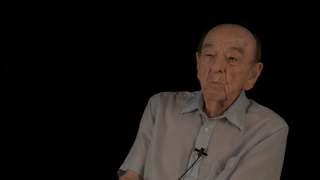5:17 | He was seasick the first two weeks, but it went away and he was never bothered by it again. Charles Fallis was on the USS Grimes, a troop transport that ferried troops to Iwo Jima, and then picked up the wounded for evacuation. When a severely wounded Marine died, he witnessed a burial at sea, something he will never forget. (This interview made possible with the support of KENNETH ANTHONY WEST.)
Keywords : Charles Fallis USS Grimes (APA-172) seasick typhoon Hawaii Maui Eniwetok Marshall Islands Mariana Islands Saipan Guam Iwo Jima Mount Suribachi wounded burial at sea

Charles Fallis was in the ninth grade when the war started, but he became part of the effort when he entered the Navy in 1944. Assigned to the beach party on a troop transport, he was surprised when he had to learn to do what soldiers do every day. (This interview made possible with the support of KENNETH ANTHONY WEST.)
While anchored off Iwo Jima, a typhoon pushed the USS Grimes near the shore, near enough to Mount Suribachi that Charles Fallis had to take cover. After dropping wounded troops off in Hawaii, the ship went back to San Francisco, where he had to take cover from an angry hotel manager. (This interview made possible with the support of KENNETH ANTHONY WEST.)
The Japanese knew that Okinawa was the last step on the Allied move toward the mainland, so they went all out with suicide attacks. Charles Fallis remembers the kamikaze alerts when he was anchored there. His ship was part of the task force that readied to invade Japan, and then after the surrender, part of the occupation. (This interview made possible with the support of KENNETH ANTHONY WEST.)
Some of the men on the USS Grimes went ashore at Nagasaki, after they delivered occupation troops there. Charles Fallis was on duty, so he missed out on that. One thing he did not miss out on was getting reacquainted with the girls back home once he got there. (This interview made possible with the support of KENNETH ANTHONY WEST.)